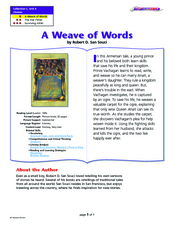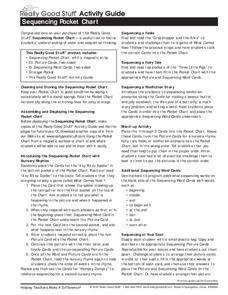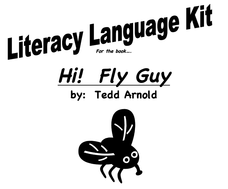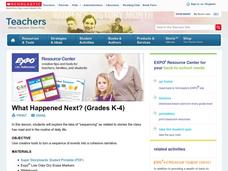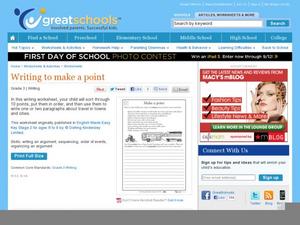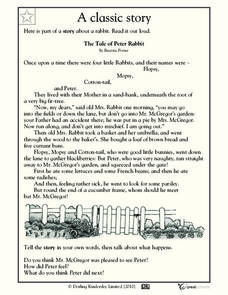Core Knowledge Foundation
First Grade Skills Unit 7
The last unit in the series by Core Knowledge focuses on alternative spellings, nouns, verbs, conjunctions, subject-verb agreement, using commas in a series, constructing sentences, and following the writing process while writing...
Curated OER
Marking Time
Two narrative excerpts tell the same story from different points of view. In the first excerpt (first person), sequencing words and phrases are bolded and learners write down what the bold type does. The second excerpt is in third...
Curated OER
A Weave of Woods
Focus on vocabulary, comprehension, and analysis while reading A Weave of Woods, a colorful picture book by Robert D. San Souci. Young learners use worksheets to preview, predict, practice paraphrasing, and make comparisons. The richly...
Curated OER
The Jacket: Journal Templates Teacher's Guide
Explore this story involving prejudice and racism to enhance learners' comprehension skills. The story The Jacket by Andrew Clements involves an African American boy who is falsely accused of stealing someone's jacket. This teacher's...
Curated OER
Lesson Plan 17: Novel, Take 2
It's all about using peer resources in this writing process lesson, which includes a fantastic novel revision worksheet packet. Learners have read a partner's story draft the night before, and groups have a "lightning round of praise"...
Curated OER
Noisy Nora, Studious Students: Story Elements
Alliterative adjective nicknames generate stories inspired by Rosemary Wells' book Noisy Nora (also a thematic complement to any class with children who make a ruckus to get attention). Class members explore basic story elements --...
Curated OER
The Mitten
Explore the Ukraine through a reading of The Mitten. Readers will determine the sequence of events, cause and effect, make predictions, and find the main idea of the story. They also use math skills to make charts and graphs. Finally,...
DocsTeach
Sequencing from Seeds to Harvest
Explore the farm to table experience in a fast-paced lesson on gardening. The activity uses image sequencing to help young scholars understand the process of growing food from seed to harvest. Academics also participate in group...
Google
Mary Poppins Returns
Make Mary Poppins proud. Young computer scientists use block-based coding to create snowflake animations with a Mary Poppins theme. They learn how to apply sequences, actions, and loops in computer science.
Curriculum Corner
Book Study: The Polar Express
All aboard! Pair a reading of The Polar Express by Chris Van Allsburg with a set of literacy activities. The packet of worksheets includes task cards, sorting activities, a synonym match, comparing and contrasting activities, writing...
Illustrative Mathematics
Where Do I Go?
Practice sequencing numbers 1–100 in a card sequencing activity. The hands-on learning makes a short activity flexible and fun. The opportunities are endless and easy to implement.
K5 Learning
Clara Barton: Civil War Hero
Gain information about Clara Barton, a Civil War hero, and enhance reading comprehension skills with a worksheet that challenges scholars to read an informational passage and answer five short answer questions.
Really Good Stuff
Sequencing Pocket Chart
Cut it out! Beginning readers practice sequencing skills at home or at school with a variety of activities that require cutting out multiple sets of picture cards and putting them in the correct order.
CC Homestead
Summarize
Designed for third graders but appropriate for older learners as well, this packet of materials underscores the necessity of teaching kids how to summarize, how to identify main ideas and supporting details, and how to ask questions...
Student Handouts
Process Steps
A straightforward graphic organizer is a great way to outline steps for any subject. Kids fill out 10 steps to describe a process or brainstorm writing, with small arrows indicating that one step leads to the next.
Do2Learn
Journal Writing
Ask learners to keep a basic journal of any number of things with this graphic organizer. Kids write in a topic and write down four events, responding to the prompts in above each box.
School District of Palm Beach County
Framed Paragraphs characterization, problem and solution, symbolism, conflict
Support your learners as they work on writing paragraphs by providing graphic organizers, outlines, and frames. Sift through this packet to find the perfect organizers and templates to prepare pupils for writing. The resource...
Poston Butte High School
Literacy Language Kit for the Book Hi! Fly Guy
Create a buzz in your class with this collection of learning activities for the book Hi! Fly Guy. Including a list of comprehension questions, a sequence of events activity, a summary writing assignment, and a vocabulary list, this...
Pearson
Reading Comprehension Sequence Chain
Follow any story and record each step on the graphic organizer provided here. There are lines to record the title, author, and illustrator, boxes where pupils can fill in character and setting, and six boxes in which learners can note...
Scholastic
What Happened Next? (Grades K-4)
Explore the structure of narrative writing with this fun, collaborative lesson. Start by reading aloud a short story, asking small groups of learners to fill in key events on a large story board prepared on the class whiteboard....
Curated OER
Writing to Make a Point
Begin your persuasive writing with a helpful exercise on making points. With a list of ten points on transportation in a city, third graders map a logical order to their argument. They then write one or two paragraphs about the points...
Curated OER
What is a Philanthropist?
What does a philanthropist do? Help your class explore philanthropy using character development and literacy ideas. Learners will define and give examples of philanthropy, listen to The Lion and the Mouse, discuss how the characters help...
Curated OER
Old Lady That Swallowed a Fly
Youngsters listen to the story, "There Was an Old Lady Who Swallowed a Fly." After discussing the story, going over new vocabulary, and repeating the rhymes in the story, they study the parts of a fly. They finish by creating a fly on...
Curated OER
Reading Practice: Peter Rabbit
Oh, that naughty Peter Rabbit! Youngsters read an excerpt aloud from the classic Beatrix Potter story "The Tale of Peter Rabbit." They retell the story in their own words and discuss the events. Readers make inferences about various...




